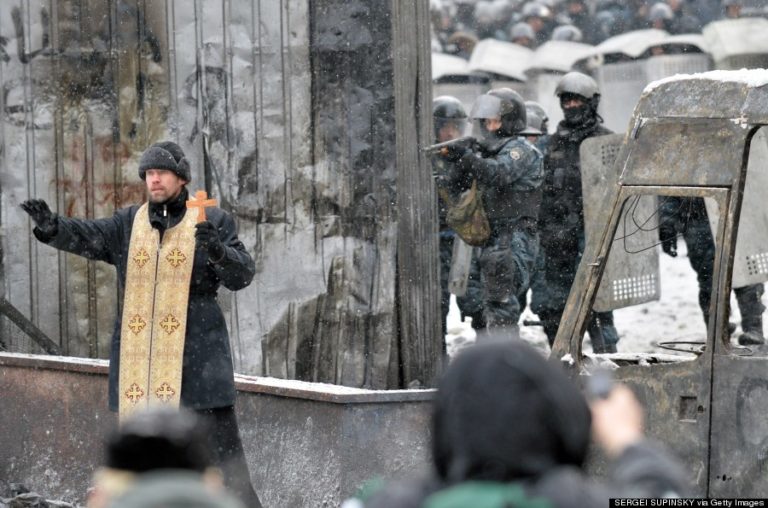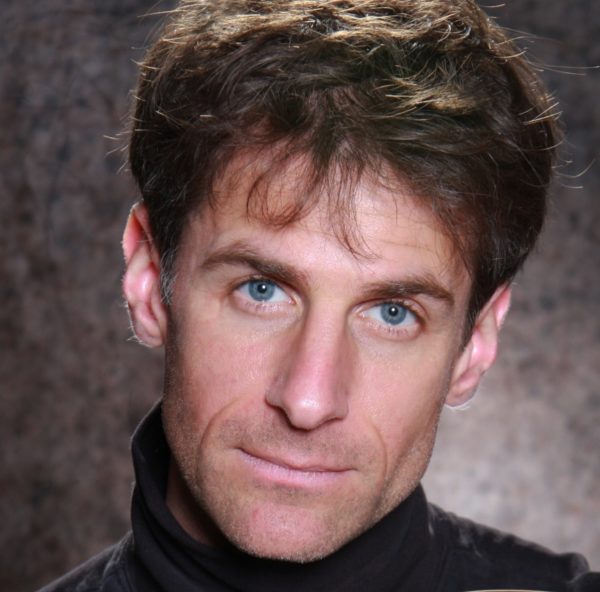
An Orthodox priest tries to stop a clash between protesters and the police at a protest in the center of Kiev, Ukraine. Image by Sergei Supinsky/Flickr, Some Rights Reserved.
This Restless Sea: Contemplative Practice and Prophetic Witness Amidst Violence
I’ve recently happened across numerous photos of the violent protests which racked Ukraine’s capital city last year. For three months a volatile crowd of protesters, swelling at one point to some 300,000 people, camped in the bitter-cold streets of the city.
Among the tumult were numerous priests. Wearing the vestments of their office and carrying crosses and icons, they were highly identifiable amidst the chaotic clash of people. Photos show them blessing both police and protestors, tending to the wounded, ministering to the dying, and praying among the dead. They set up prayer tents, and a cathedral’s nave served as a temporary hospital and shelter.
The most striking photos show them — some alone, some with one or two others — standing between the lines of police and the angry mobs. One photo shows a resolute bishop who alone served as a human shield to quell the violence. Another shows two priests with votive candles burning and crosses in hand doing the same.
Perhaps the most provocative photo pictures a young priest giving absolution to a penitent on the rubble-strewn and frozen streets. The penitent is kneeling in the ice before the priest, who has draped his colorful broad stole over the penitent’s head in typical Orthodox fashion, in an open area between protesters and a line of riot police. The defensively positioned ranks of police with their shiny helmets, black riot gear, and silver body shields form the ominous and unlikely background to the intimate rite. Despite the situation around them I am struck by the calm, matter-of-fact look on the priest’s face, as if he might be standing in his own church receiving one of his parishioners.
These scenes immediately bring to mind the identical nature of prayer and engagement, of contemplative practice and prophetic witness in the world.
The temptation to separate contemplation and activity has hounded Christianity from the beginning, and from the beginning it has been rejected. When the disciples wanted to take up arms, Jesus pointed them to the cross, to God’s way of love and forbearance, so that they might remove the plank from their own eye before poking another’s eyes out.
When the disciples wanted to hide behind locked doors, to wall themselves off from the clamoring world, Jesus penetrated through and sent them out into the world’s danger. Though Mary chooses the better way by sitting at the Lord’s feet, her discipleship will be fulfilled only when she goes out from the garden and proclaims the impossible and glorious emptiness of the tomb.
Without first learning to retreat, one’s advancing becomes chaotic, confused, and contentious. Without knowing how to advance, one’s spiritual life becomes flimsy, sentimental, and tiresome. In contemplation, there must be decisive, prophetic action; in action, there must be openness, recollection, and prayer.

Contemplative practice is not the domain of the lazy priest or the indolent monk. Living a contemplative life certainly means guarding against undue stresses and frenetic activity, but a life that is contemplative is not just a life lived at ease. Though relaxation, poise, and the quelling of free-floating anxiety can be by-products of a deep contemplative practice, these are not its goals. On the contrary, the contemplative is a soldier and her practice is preparation for, and the certainty of, a face-to-face confrontation with evil. The contemplative runs from the distractions of the world only to expose the clamor of evil and sin in the quiet of stillness and the light of an unwavering gaze — to confront there the enemy face-to-face as if in a mirror. In other words, she meets the enemy in her own heart.
Realizing that I and my foe are one sheds a wholly different light on the command to forgive one’s enemies and pray for one’s persecutors, even as it brings to its logical conclusion the need to love one’s neighbor as oneself. If we can face the enemy with forbearance in the crucible of contemplative practice in a safe place of prayer, we will learn to face him anywhere. Like the priests in Ukraine, we might then stand peaceably in the midst of the frenzy of hatred and strife as an articulate instance of the strength of love.
Self-gifting love is the true goal of contemplative practice, not self-actualization, and it is this love which gives us true poise and freedom from anxiety. We become free to witness courageously to the world and to respond appropriately and unreservedly to suffering.

If the clandestine enemies of the world are greed, hatred, envy, strife, murder, apathy, corruption, partiality, rapaciousness, and so on, then we need only sit down quietly to find them. This sitting down and facing them is the prophetic action of the true contemplative. He is not playing games; he is not running away; he is not trying to be spiritual or make a show. He is merely responding to the imperative of the world, and by doing so, taking deep social action by remaining still.
“I will fight for you,” proclaims the Lord, “you have only to be still.” Some Christians believe that the more they do, the more apparent God’s kingdom will be, as though God’s kingdom somehow depends on them. This is why sin and strife are such a great tragedy, because the banquet is laid before us while we starve beneath the table, curled up and close-mouthed. Be filled, and then you will be food to the world.

It seems to me that the actions of these priests, at least as they come to me in these photos, come from a place of true faith. Faith makes no show, nor does faith act anxiously and restlessly. Faith needn’t make work for itself, for it knows to its marrow that “all shall be well, and all manner of thing shall be well.” This was the great proclamation of faith from the pen of Julian of Norwich in the midst of the Great Plague. Who would have believed her? Who believes her now?
Contemplative action must be a spontaneous surge rolling from out of this restful sea of faith. Only then will such action provide true Christian witness to the world. Only then shall we proclaim to the world that it is God’s and that God can be trusted. Only then might we inspire the world to put down the gun, to cast aside the blade, to strip off the armor and dive into the great sea of forgetting that is forgiveness. And if the world smites us with bitter jibes, taking us into its sights and taking us down, then we, too, shall forget and sink into the blessed verve of God, and it shall be little different than sitting still.
